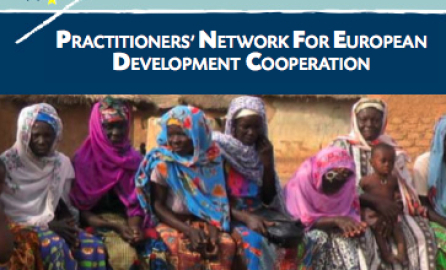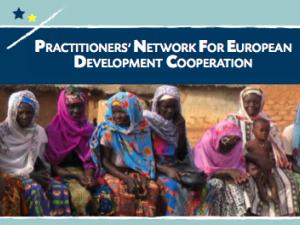The Practitioners’ Network of European Development Cooperation is an informal platform that brings together European public agencies and institutions in charge of executing bilateral and EU development cooperation. They have joined forces to share their experience and good practice, and work on European Union policy issues with regard to development.
The Practitioners’ Network members are the implementing organisations of the European Union Member States and the European Commission, who jointly represent over 70% of the European Union’s overseas development assistance (ODA).
The current membership includes the European Commission (EuropeAid), GIZ, Lux Dev, AFD, Austrian Development Cooperation, AECID, Adetef, DFID, BTC, Czech Development Agency, KfW, Slovak Aid and SNV.
The Network aims to encourage cooperation amongst policy implementers, to share and develop knowledge from the field, thereby improving the effectiveness of European development cooperation approaches.
“It is an enormous pool of expertise in delivering development assistance, and so we have excellent exchanges, “ said Klaus Rudischhauser, EuropeAid's Deputy Director General, Policy and Thematic Coordination, at his office in Brussels earlier this week.
The Network also provides feedback on European development policies, enriching the debate with the practitioners’ perspective.
“They also provide input in policy making, and we have very practical reasons to cooperate,” continued Mr Rudischhauser. “For example, recently we had excellent exchanges on defining the new Template for Delegated Cooperation with the individual members of the Practitioners’ Network, so we can actually involve them very directly, not only in developing our policies, but also our ways and procedures.”
At the EU Development Days in November 2013, a number of member representatives explained the Network’s role and outlined its value.
“It is an important partnership – the European Commission together with Member States can be much more powerful if they join forces in a partnership way,” said Christoph Beier, Managing Director of GIZ.
“There are two main advantages,” added Dr Horst Fischer, Director of the GIZ Representation in Brussels: “Learning from each other; from the EU and from the field. The organisations all have different experiences, different qualities and they all have to live with their national rules and regulations.”
“The second main advantage is to take this learning process to the European Commission, and at the same time make them aware of what the difficulties could be in the field,” he said.
European practitioners first got together following the 2004 EU enlargement, when some European national donors invited all European Agencies and Aid Administrations, including the Commission and the EIB, for an informal meeting in November 2005. At a second meeting in February 2007, over 20 different European donor organisations participated, laying the paving stones of an informal European network of practitioners.
Today, all members meet annually to define the Network's strategies and tools, and to exchange views on topics of common interest and ideas for joint activities.
“Our target is to translate policy commitments into operational work,” said Robert Zeiner the Director for the International Projects and Programmes of the Austrian Development Agency, currently acting as the President of the Practitioners’ Network: “We agree easily to principles and objectives, but when it comes to the operational part it is not easy. We are finding concrete ways of working together and sharing this knowledge and experience.”
Working groups meet more regularly, structured around four thematics, dealing with the EU Division of Labour, Results-Based Approaches, Sustainable Energy and Knowledge Sharing.
“We are very proud of the way in which we are carrying on with knowledge-sharing, as it takes time and confidence to speak frankly to one another and to share knowledge to improve the quality of our work abroad,“ said Javier Jiminez de Gregorio, Senior Advisor Director’s Office of AECID, the Spanish Agency for International Development Cooperation.
“We should share in order to avoid overlapping and the wastage of public resources,” he added.
To facilitate further information sharing and exchange, the Network is formalising a new knowledge-sharing group on www.capacity4dev.eu.
The Network encourages all European public agencies, administrations or development banks in charge of the implementation of official development assistance, to participate to their activities. “There is great potential to enhance the link between decision makers and agencies, who have the same concerns in mind about how to implement policies,” said Gwenaelle Corre, the Network's Coordinator.
“What is positive is that the network has grown,” said Mr Rudhischhauser. “Obviously - ideally - all the agencies in Member States should be there.”
For further information, please visit the Practitioners’ Network of European Development Cooperation website.
This collaborative piece was drafted with input from Gwenaelle Corre, the Practioners' Network Coordinator and Karen de Jonghe from EuropeAid, with support from the capacity4dev.eu Coordination Team. The photo is from the Practitioners' Network website.



Log in with your EU Login account to post or comment on the platform.